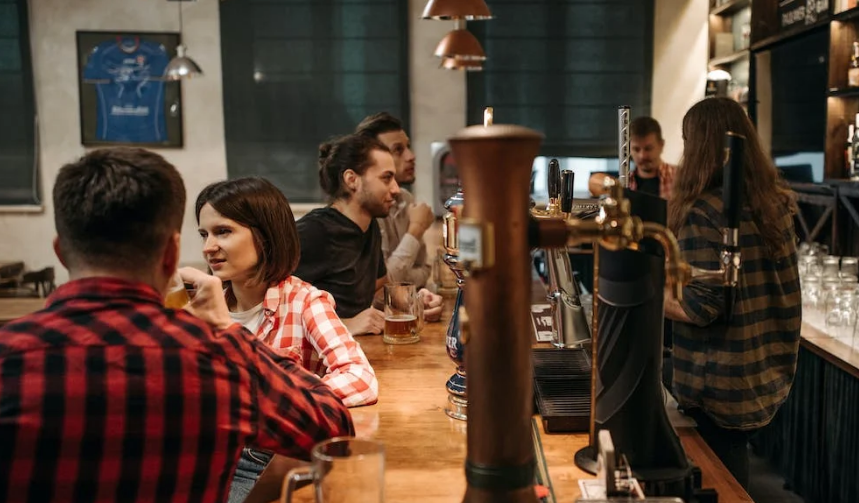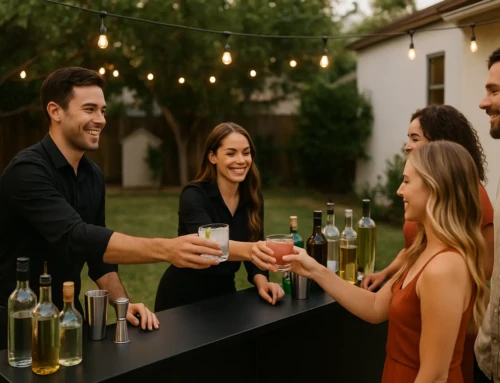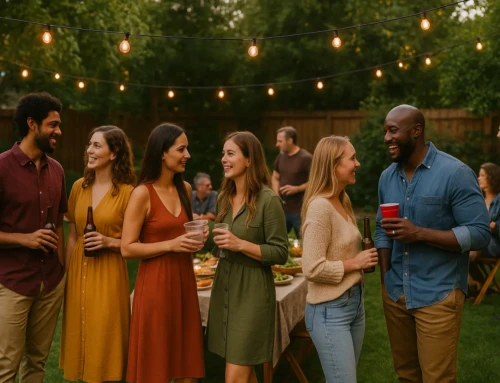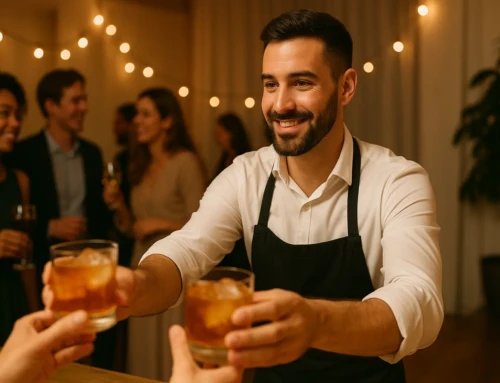
Everyone out there is likely to want to ask bartender questions from time to time. This is common when a bartender is working at a club or even for private events.
Responding to the 10 Most Common Questions People Ask Bartenders is not an easy task as it can be answered in many ways. Also, the best answers can usually be the ones that have been most commonly seen.
Behind the polished counter of a bustling bar, bartenders embody a unique blend of artistic mixology and empathetic listening. They are the alchemists who not only pour drinks but also lend an ear to the stories and queries of their patrons.
In this article, we delve into the fascinating world of bartending, exploring the ten most frequently asked questions that people pose to these masters of libations. Join us as we unravel the captivating role bartenders play in crafting unforgettable experiences for their customers. One of the other common bartender questions.
What’s your specialty cocktail?
Ah, the moment of excitement when customers yearn to uncover the secret gems hidden within a bartender’s repertoire. This question serves as a gateway to an enchanting world of crafted concoctions. Mainly where skilled mixologists proudly present their signature drinks. It’s an opportunity for bartenders to showcase their creativity. Also, by infusing their unique touch into every glass and leaving guests in awe of their artistic prowess.
What beers do you have on tap?
Beer aficionados, unite! The ever-curious souls seeking the perfect brew often turn to bartenders for guidance on the tantalizing offerings on tap. Behind the bar, these guardians of booze possess an encyclopedic knowledge of various brews—be it the local favorites, seasonal surprises, or the latest craft creations. Also, a bartender’s expertise helps seekers of fermented perfection find their beer soulmate.
Can you recommend a good wine?
For those craving a touch of sophistication in their glass, the quest for a divine wine recommendation begins. Bartenders, in their dual roles as drink artisans and sommeliers, are well-versed in the world of wines. Armed with knowledge of varietals, regions, and flavor profiles. Also, they guide patrons towards the perfect bottle or glass of wine, elevating their experience to new heights of refined pleasure.
Do you have any non-alcoholic options?
In a world increasingly embracing the diversity of drink preferences, the query for non-alcoholic or low-alcohol beverages echoes through the air. Those who opt to abstain from alcohol desire a drink that tantalizes their taste buds without the intoxicating effects. Fear not, for bartenders have embraced this trend with open arms. Offering a delightful array of mocktails and alcohol-free spirits to ensure that every guest finds a refreshing elixir that suits their fancy.
What’s in the house cocktail as bartender questions?
Ah, the allure of the house cocktail! One of the common bartender questions. Curiosity entices customers to inquire about the mystifying concoctions born from the bar’s secret cauldron. A bartender’s face lights up with delight as they share the ingredients and tales behind these signature elixirs. This question becomes a gateway to a realm where flavors mingle in harmony and imagination runs wild. Also, making each sip an adventure to be savored.
What’s your happy hour special?
Seekers of good deals and friendly camaraderie often raise their voices to ask about the magical realm of happy hour specials. As if unlocking a treasure trove of discounted delights, bartenders reveal the secrets of this enchanting period, where drinks and appetizers are accompanied by laughter and warmth. Also, the shared excitement of this revelation creates an atmosphere that lingers long after the glasses have been emptied.
What’s your strongest drink as a common as common bartender questions?
Sometimes, adventurers with a taste for daring libations dare to seek the strongest elixirs known to humankind. With a glint in their eye, patrons pose the question, tempting bartenders to share tales of concoctions that pack a punch. The bartender’s response becomes an educational moment, a reminder of the fine balance between pleasure and restraint, ensuring customers make informed decisions on their path to revelry.
Can you make me a custom cocktail?
Imagination knows no bounds when customers yearn for a drink that speaks to their unique cravings and preferences. With an air of anticipation, they turn to the maestros behind the bar and request a personalized creation. Like a symphony conductor, the bartender deftly weaves flavor. Also, exploring uncharted territories of taste to craft a libation that resonates with the customer’s very soul.
Do you have any drink specials tonight?
Beyond the realm of happy hours, a sense of curiosity prevails, and patrons eagerly inquire about the mystical elixirs available exclusively on that particular night. Bartenders, like keepers of ancient knowledge, share the whispered secrets of limited-time promotions, themed evenings, and tantalizing drink features. This question unveils a world where surprises await, creating an air of anticipation and transforming an ordinary evening into an extraordinary affair.
What’s your favorite drink to make?
In this dance of conversation, customers often seek a glimpse into the heart and soul of a bartender. With a spark of curiosity, they inquire about the favorite drink that their drinksmith loves to conjure. The question unveils a personal connection, igniting an animated conversation where the bartender’s passion flows, and stories unfold. Also, an invitation to venture beyond the menu and experience a libation crafted with genuine affection.
Being a bartender is more than just pouring drinks
It’s about connecting with people. Bartenders interact with a wide range of customers every day, acting as hosts, listeners, and even confidants. That’s why having emotional intelligence is crucial for bartenders to effectively handle questions and navigate the social intricacies of their job. Let’s delve into why emotional intelligence is so important in the world of bartending.
Building rapport and connecting with customers with bartender questions
When you step up to the bar, you want more than just a drink. You want an experience, and emotional intelligence is what turns a simple transaction into a meaningful connection. Bartenders with high emotional intelligence understand the power of active listening, empathy, and genuine engagement. In addition,they take the time to ask the right questions and really understand their customers. Also, creating a warm and welcoming atmosphere where people feel valued and appreciated.
Handling difficult or emotional situations
Life isn’t always smooth sailing, and sometimes people come to the bar seeking solace or a temporary escape. Emotional intelligence allows bartenders to recognize when someone is stressed, upset, or in need of a sympathetic ear. By remaining calm and composed, bartenders can offer support, a comforting presence, or simply a safe space to vent. With carefully chosen words and a compassionate demeanor, they can help customers find relief or resolution to their concerns.
Providing personalized recommendations
As a bartender, you’re not just a mixologist, but also a trusted advisor on the world of drinks. Customers rely on your expertise to guide them through the vast array of options. Emotional intelligence comes into play when you ask the right questions, truly understand their preferences, and take into account factors like taste, mood, and dietary restrictions. Armed with this knowledge, you can offer personalized recommendations that go beyond mere beverages, creating memorable experiences tailored to each individual.
Conflict resolution with bartender questions
Even in the most convivial settings, conflicts can arise. Also, as a bartender, you’re often in the frontline of these situations. Emotional intelligence equips you with the tools to defuse tension and find peaceful resolutions. By actively listening, showing empathy, and using effective communication, you can understand the concerns of all parties involved and mediate a satisfactory outcome. Your ability to navigate conflicts gracefully helps maintain a harmonious atmosphere. Mainly where everyone feels respected and heard.
Enhancing customer satisfaction and loyalty
When customers step into a bar, they seek more than just a drink; they want an experience that leaves a lasting impression. Emotional intelligence allows you to create that experience. By connecting with customers on an emotional level, you make them feel genuinely welcomed and cared for. Satisfied customers are not only more likely to return but also to become advocates for your establishment, spreading the word to friends and colleagues. Also, in turn, leads to increased customer loyalty and ultimately contributes to the success of the business.
Emotional intelligence is a fundamental trait for bartenders. It helps you build rapport and create connections, handle difficult situations with grace, provide personalized recommendations, resolve conflicts peacefully, and leave a lasting positive impact on your customers. So, the next time you step behind the bar, remember that your emotional intelligence can be just as important as your mixology skills in delivering an exceptional customer experience.
Is the customer always right when asking bartender questions?
We’ve all heard the saying, “The customer is always right,” but in the dynamic world of bartending, this idea requires a closer look. Bartenders face a myriad of customer service challenges that demand a delicate balance of professionalism, tact, and customer satisfaction. In this article, we’ll delve into how bartenders handle the concept of “the customer is always right” and share insights on effectively managing customer service situations.
Understanding the Customer Perspective:
While valuing customer opinions and preferences is crucial, it’s important to acknowledge that customers may not always have the complete picture. As a bartender, your expertise and experience come into play when guiding patrons and making recommendations. Also, striking a balance between respecting customer preferences and offering knowledgeable advice is key.
Active Listening and Empathy:
One of the fundamental skills bartenders utilize in customer service challenges is active listening. Taking the time to genuinely hear customers’ concerns or grievances fosters rapport and shows that their opinions matter. By empathizing with their feelings and validating their experiences, bartenders can establish an emotional connection. This approach often diffuses tension and opens the door to finding mutually agreeable solutions.
Effective Communication:
Clear and effective communication is paramount when navigating customer service challenges. Bartenders should aim to communicate calmly, respectfully, and assertively. When faced with demanding or mistaken customers, maintaining composure is crucial. Explaining policies, limitations, or alternative options in a considerate manner helps customers understand the reasoning behind decisions and fosters understanding.
Seeking Win-Win Solutions:
Bartenders often encounter situations where customer demands clash with establishment policies or professional judgment. In these instances, seeking win-win solutions becomes essential. Rather than approaching the situation as an adversarial conflict, bartenders can engage customers in constructive dialogue to find mutually beneficial outcomes. Suggesting compromises, presenting alternative options, and tapping into creativity can lead to satisfying resolutions.
Consulting Colleagues and Management:
There are times when customer service challenges require input from colleagues or management. Recognizing the limits of your authority or expertise is key as a bartender. Seeking advice or involving a supervisor demonstrates a commitment to delivering the best possible customer experience while adhering to established guidelines. Also, consulting others brings fresh perspectives and insights, leading to more effective problem-solving.
Maintaining Professional Boundaries with bartender questions
Creating a welcoming and inclusive environment is important, but bartenders must also establish and uphold professional boundaries. Occasionally, customers may display disrespectful or inappropriate behavior. In such situations, bartenders need to assertively reinforce boundaries while still addressing the customer’s needs. This may involve seeking assistance from security personnel, involving management, or, if necessary, refusing service to maintain a safe and respectful atmosphere for all patrons.
5 compelling reasons why bartending requires good customer service
Engaging with customers
Bartending is all about connecting with people. A great bartender needs top-notch customer service skills to interact with patrons, make them feel valued, and ensure they have a fantastic experience. That means actively listening to their needs, offering suggestions. Also, addressing any concerns or questions they might have.
Handling tricky situations as bartender questions
Let’s face it, bartenders often encounter challenging situations like dealing with rowdy customers, handling complaints, or resolving conflicts. That’s where excellent customer service comes into play. A skilled bartender can defuse tense situations, stay cool and composed. Also, finding solutions that satisfy both the customer and the establishment.
Creating a welcoming vibe
Bartenders are not just drink mixers; they are atmosphere creators. They play a crucial role in crafting a warm and inviting environment at the bar. By providing friendly and attentive service, bartenders make customers feel right at home, encouraging them to come back and fostering a sense of loyalty. Also, a positive experience adds to the overall reputation of the place too!
Building relationships and boosting sales
Bartenders have the chance to upsell, recommend special concoctions, or introduce new drinks. By delivering exceptional customer service, they can build genuine connections with customers, gain their trust, and even increase sales. Developing relationships with patrons keeps them coming back and may turn them into loyal regulars. Also, it’s a win-win for the establishment!
Mastering multitasking and time management as bartender questions
Bartending is like a high-energy juggling act. Bartenders have to multitask like pros, managing multiple customers, drink orders, and keeping the bar area spick and span. With great customer service skills, they ensure that no one feels neglected, orders are served promptly, and everyone gets the attention they deserve, even during the busiest times.
Party Shakers offers the ultimate service for those who need results
There is no doubt that making sure that you are able to ge the best bartending services is essential. Also, this is the reason why Party Shakers makes sure that you are able to get the bets results out of your events.
Questions and answers about bartender questions
Is the customer always right?
They say that the customer is always right but this is not necessarily the case all the time. There are some cases when people can be difficult and a good bartender needs to know how to handle this.
Should a bartender answer all questions during their work day?
A bartender needs to know when to politely stop a conversation in order to keep working. Also, this is going to prove to be essential for the best outcome.
How do you choose a great bartending service?
It is all a matter of researching a service that is not only reliable, but also one that offers high quality services.
Final thoughts on bartender questions
There are many people who like to ask bartenders questions. The best bartenders are always going to have practical answers to those questions to guarantee a great service.




